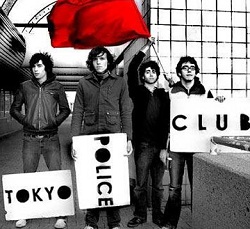(Planet of Sound is a bi-weekly speculative fiction music feature.)
Most of the songs thus far featured in Planet of Sound come from bands and singers with lengthy, well-respected discographies, which I’ve liked for a long time and am simply enjoying the chance to revisit in a new light and potentially introduce to a new audience. However “Citizens of Tomorrow,” a handclapping emo-pop elegy of robopocalypse, comes from Tokyo Police Club, an Ontario-based band whose members have all been alive for less time than Warren Zevon, Tom Waits, or James Taylor have played music.
This is a single song that caught my attention from a band I hadn’t previously heard anything else by, and it’s especially interesting both for the completeness with which it commits to the sci-fi dystopian narrative in the context of a mainstream-indie song, and for the utterly pessimistic attitude these young’uns take, at least in the space of this one song, towards their own future.
The story is something like Wall-E meets The Terminator, a classic robot uprising. Humanity turns to artificial intelligence to solve its problems, and finds the A.I. far less benevolent than hoped.
See the ruins of the old world below
That’s what our ancestors left us.
Our robot masters will know
How to clean this mess up
And build a better world
For man and machine alike
For the boys and the girls
Who are slaves building spaceships at night
In the fluorescent light.
After this first introductory verse, though, comes the punchline:
That’s 2009.
The song, from the A Lesson in Crime EP, was released in 2006 (when three out of the four band members were under age 20), so while it’s not the precisely contemporaneous year, it still has the feel of the day after tomorrow.
I found that date particularly suggestive, though, for another reason: that’s the year Obama took office. And I’m certainly not saying that I suspected the Canadian youth to secretly be hard-line conservatives (there’s your 2012 smear campaign: “A vote for Obama is a vote for robot overlords!”), but there were parallels to the campaign and election in the lyrics that seemed to address, not how Obama related to the Republicans, but how young Democrats related to Obama.
Those parallels begin with the very first words of the song, a chant of “No, we can’t!”, and continue after that 2009 punchline with an expanded version: No we can’t, no we won’t, no we can’t, no we won’t!
But the dates don’t match up: Barack Obama announced his candidacy at the beginning of 2007, and “Yes, we can” was a campaign slogan introduced, as far as I can tell, in the New Hampshire primary victory speech in January 2008. Tokyo Police Club could not have heard the phrase and associated it with Obama and this upwelling of young liberal political interest at the time of composition. And this was disheartening, because I was all prepared to do a compare-and-contrast on how putting all your faith in a single hope outside of yourself—whether a presidential candidate or a supercomputer—will never pay off, and how “Yes, we can” is a futile motto when it is answered by a massive, silent, implicit “No, we won’t.”
If Tokyo Police Club had been reacting to Obama, they’d have been contrarian cynics to the optimism he was trying to foster; as it is, perhaps they’re demonstrative of some of the reasons Obama’s “revolution” seems to be failing in public perception.
Because “Citizens of Tomorrow” is less a cautionary tale than a lament, less activism than pessimistic apathy. There is nothing anyone can do to avert the catastrophe—it’s already here, and its seeds were planted generations ago. When the narrator’s mother speaks in the second verse, she says:
This is not how we planned it
But we’ve gotten ahead of ourselves.
Computers rule the planet
And the moon and mars as well.
We lost the fight.
The fight is lost, and the younger generation has no hope of struggling back to what their parents once had. The final verse is all about the futility of any attempt to escape from robot slavery (the narrator has an explosive microchip implanted in his heart, you see), and the final words are not a call to action, but a weak and resigned sigh: “Citizens of tomorrow, be forewarned.”
And even though all this is happening in an entirely science-fictional context, I’d be surprised if this song didn’t reflect some true feelings for its writers about the world “our ancestors left us.” Sometimes it does feel like nothing we can do will help it. And yet, of course, that feeling is one which ensures that nothing will be done.
It’s the sort of immensely complicated, immensely important conundrum that requires much more serious forums than a blog post to even have a hope of addressing reasonably, but it’s the prerogative of the pop song to invoke it in three minutes and exit on a minor chord.
Or maybe I’m just overthinking a catchy song about robots.
Joshua Starr is a fan of speculative fiction in all media. ALL MEDIA.










